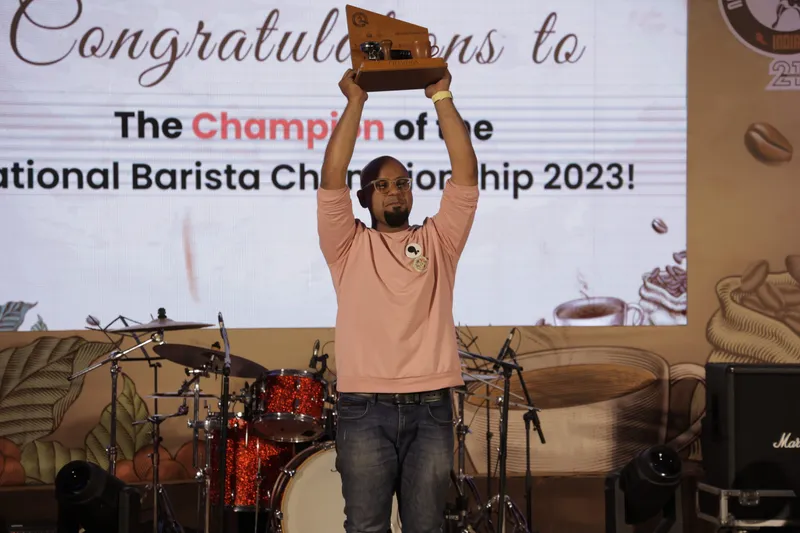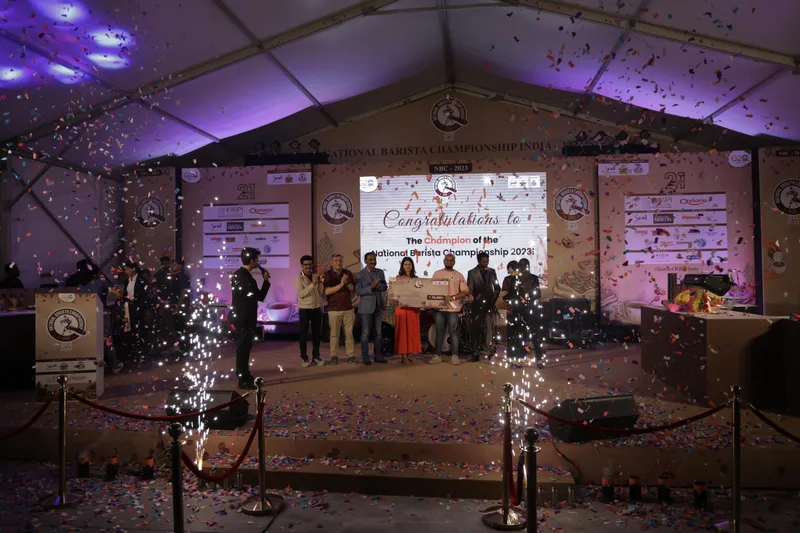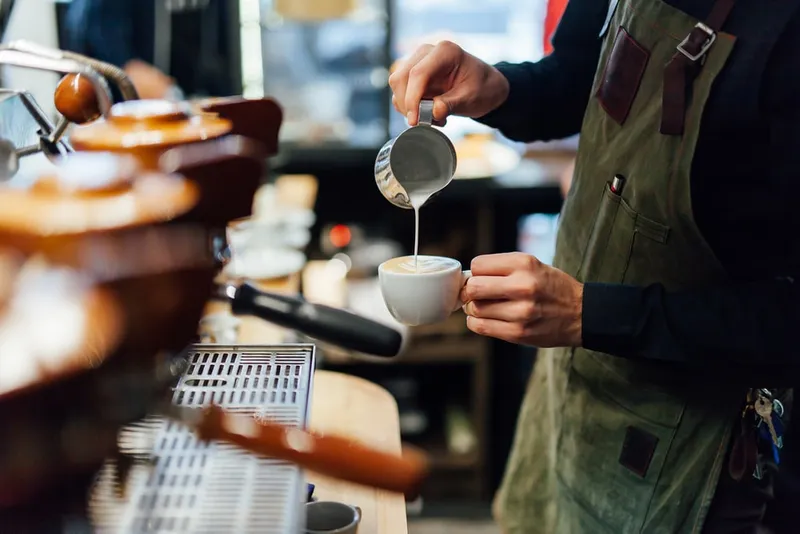Conquering speciality coffee at the National Barista Championship 2023
The National Barista Championship in Bengaluru featured 60 baristas from across India and from some of the best coffee houses in the industry and home brewers.
This past week was abuzz with caffeine-induced energy at the 21st National Barista Championship 2023, held between February 14 to 19 at the Orion Mall in Rajajinagar, Bengaluru.
Jaseem Abbas, a home brewer who goes by his handle @ninedotcoffee on Instagram, was crowned the winner, and in June, he will travel to Athens to represent India at the World Barista Championship 2023.
“This used to be a very subtle, small event where we did not have coffee traders, cafe owners, or even equipment manufacturers participate. So, we made it bigger by allowing brands to exhibit their products and expose Indian coffee to the audience,” D. M. Purnesh, President of the Speciality Coffee Association of India, revealed to YS Life.

Jaseem Abbas, Winner of the National Barista Championship 2023
A stroll through the exhibition section will give one insight into how big the event has become. From coffee estates and bean roasters, to cafe owners, and equipment makers, every stage of the coffee bean’s journey is represented.
Attendees could mingle with industry leaders, sample exquisite coffee blends, learn about coffee preparations, equipment and techniques, and enjoy live music and entertainment.
The National Barista Championship featured 60 baristas from across India—some of the best coffee houses in the industry and home brewers who competed for the title of the National Barista Champion. The jury members included certified Q Graders (professionals skilled in the sensory evaluation of coffee), technical judges, and a World Barista Championship Committee-recognised head judge.
The technical judges look at what the barista does behind the counter—station management, skill with the espresso machine, the tamping, coffee extraction times, etc. The sensory judges (Q Graders) evaluate the ‘crema’ of the espresso, the aromas of the beverages, harmony and balance in the taste, the temperature and tactile experience while sipping the beverage, and the functionality of the vessel.
“The barista will tell us how their beverage is supposed to taste. We listen to them for the accuracy of their descriptors too,” explained Mandappa, Divisional Head (Coffee Quality) at the Coffee Board, a certified Q Grader and one of the sensory judges at the championship.

At the National Barista Championship 2023 in Bengaluru
Each barista serves three beverages—first, an espresso, second, an espresso-based milk beverage, third, an espresso-based signature beverage.
“We’re not looking at Latte art here. We’re looking at sheen, synergy, and contrast between the milk and coffee when judging visuals. When we take a sip of the beverage, we see how the espresso is in harmony with the milk,” Mandappa added. The current edition of the rules allows for only cow’s milk, but future editions will allow branded plant-based milk alternatives.
The signature beverage gives baristas the liberty to come up with their own concoctions, as long as the base remains a shot of espresso. “My coffee had pineapple, green grape, mulberry, black tea, Demerara sugar syrup, strawberry syrup, and butter, which I had melted with coffee,” said Suhas Dwarakanath, Owner at Benki Brewing Tools, and one of the contestants.
“These ingredients played with the flavour of the espresso and brought out completely new flavours, like how mixing red with yellow gives us another colour. In the end, my coffee had notes of muskmelon, papaya, salted caramel, and a black tea finish,” he described.
Winner Abbas’ Nitrogen Oxide-infused signature brew had notes of sweet lime, jasmine, orange candy, and sweet papaya. “I used coffee from Tat Tvam Asi Estate as it was one of the most organic and naturally-processed coffees I could find,” he said. “The pressure is intense; there’s no room for error. No sudden movements, no spillage. It’s a beautiful situation to be in. The perfect balance of pressure and cannot be experienced unless one goes up on stage,” Abbas added.
Speciality coffee and Bengaluru have a symbiotic relationship. Karnataka is one of the largest coffee-growing regions in India. The city has a growing cosmopolitan population with the awareness, time, and willingness to experiment with new flavours.
Speak to any brewer or barista, and they’ll have the same things to say: Coffee is not just bitter. One can notice sweetness, florals, fruitiness, and a pleasant bitterness that makes it beautiful and interesting. It’s like tasting a fine wine or a scotch whiskey.
“Coffee can change completely profile-wise with different types of roasting (light, medium, or dark), grind sizes, and brewing equipment. In fact, I came across a variety of cups that allows the coffee to aerate, allowing for more flavour to come out,” said Purnesh.
According to Dwarakanath, one of the challenges in making speciality coffee mainstream is shifting consumers away from the chicory-infused, sugary filter coffees Bengaluru is used to.
“Speciality coffee doesn’t have to be overwhelming. I understand it’s more expensive, but selling smaller portions so they’re affordable is something we do at the Benki cafés. We don’t sell anything above Rs 150, and we use the same premium coffee I used in the competition today,” he added.
Mandappa staunchly believes in drinking what one enjoys while taking the time out to experiment with new food and drinks to develop a refined palate. “It’s always good to experiment and see how a different ingredient tastes, maybe a berry or an exotic fruit,” he said.
“When one is starting, make descriptions easier for yourself and look at basic nuances like sweetness and bitterness (favourable bitterness like bitter gourd, dark chocolate, and stout beer; and unfavourable bitterness like astringent and burnt). The common consumer should first look for a balanced coffee,” added Dwarakanath.
Coffee journeys often start with the quintessential bottle of Nescafe’s instant coffee powder. Speciality coffee, however, works differently.

Right from the quality of the soil and the manure fed to it to the skill of the barista pouring out your drink—each step is crucial in brewing a good cup of coffee.
“It’s about appreciating the journey of the coffee bean. It’s a chain reaction. The farmers, the roasters, the barista—there are hundreds of steps before it reaches your cup,” said Abbas.
“A coffee planter’s job is 365 days, round-the-clock work,” added Purnesh. “We nurture plants through the year for a single crop. The last few years have seen climate change, and the current challenge is adjusting to changing patterns of rain,” he added.
Many coffee planters have developed multi-cropping systems by growing pepper, areca nut, cardamom, avocados, and assorted fruits and vegetables. This keeps a steady flow of income and adds nuances to the flavour of the coffee.
The Speciality Coffee Association of India was set up by passionate coffee planters who wanted to put India’s coffee on the world coffee map. “Everything happens with the support of the Coffee Board, controlled and funded by the Ministry of Commerce and Industry, Government of India. They help us promote coffee in India and the world market. They are one of the main sponsors and supporters of the National Barista Championship,” said Purnesh.
With the close of the 2023 edition of the championship, Abbas is looking forward to his competition in Athens this June. “I’d like to thank my roaster, who introduced me to the coffee I used for the championship. And, since I’m representing India, I want to represent India’s coffee on the world stage. I’ll be going up against the best of the best,” he added.
Edited by Suman Singh







